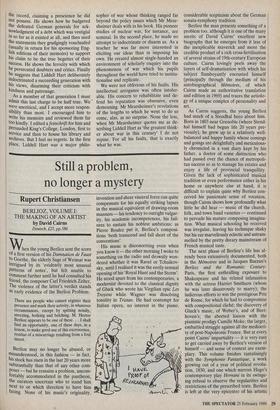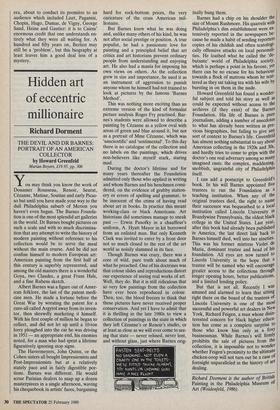Still a problem, no longer a mystery
Rupert Christiansen
BERLIOZ, VOLUME I: THE MAKING. OF AN ARTIST by David Cairns
Deutsch, £25, pp.586 ■
hen the young Berlioz sent the score of a first version of his Damnation de Faust to Goethe, the elderly Sage of Weimar was intrigued by its 'evidently most unusual patterns of notes', but felt unable to Comment further until he had consulted his friend, the composer Carl Friedrich Zelter. The violence of the latter's verdict stands as early evidence of the Berlioz Problem:
There are people who cannot register their presence and mark their activity, in whatever circumstances, except by spitting noisily, sneezing, hoiking and belching. M. Hector Berlioz appears to be one of these. . . I shall find an opportunity, one of these days, in a lesson, to make good use of this excrescence, residue of a miscarriage resulting from a foul incest.
Berlioz may no longer be abused, or misunderstood, in this fashion — in fact, his stock has risen in the last 20 years more substantially than that of any other com- poser — but he remains a problem, uncom- fortably accommodated in the pantheon, the curators uncertain who to stand him next to or which direction to have him facing. None of his music's originality, invention and sheer visceral force can quite compensate for his equally striking lapses in the musical equivalent of drawing-room manners — his tendency to outright vulgar- ity, his academic incompetences, his fail- ures to sustain his noblest ambitions: as Pierre Boulez put it, Berlioz's composi- tions 'both transcend and fall short of the conventions'.
His music is disconcerting even when you know it — the other morning I woke to something on the radio and drowsily won- dered whether it was Ravel or Tchaikov- sky, until I realised it was the eerily sensual opening of his 'Royal Hunt and the Storm'. He stood apart from his contemporaries, a modernist devoted to the classical dignity of Gluck who wrote his Virgilian epic Les Troyens while Wagner was dissolving tonality in Tristan. He had contempt for Italian opera, no interest in the piano, considerable scepticism about the German sonata-symphony tradition.
Berlioz the man presents something of a problem too, although it is one of the many merits of David Cairns' excellent new biography that he emerges from it less of the inexplicable maverick and more the credible product of a rich cross-fertilisation of several strains of 19th-century European culture. Cairns lovingly peels away the layers of self-dramatisation with which his subject flamboyantly encrusted himself (principally through the medium of his autobiographical Memoires, of which Cairns made an authoritative translation and edition in 1969) and traces the aetiolo- gy of a unique complex of personality and art.
As Cairns suggests, the young Berlioz had much of a Stendhal hero about him. Born in 1803 near Grenoble (where Stend- hal himself had begun life 20 years pre- viously), he grew up in a relatively well- balanced and happy family whose comings and goings are delightfully and meticulous- ly chronicled in a vast diary kept by his father, a doctor of some distinction who had passed over the chance of metropoli- tan success so as to manage his estates and enjoy a life of provincial tranquillity. Given the lack of sophisticated musical tradition or even performance either in his home or anywhere else at hand, it is difficult to explain quite why Berlioz con- ceived his passionate sense of vocation, though Cairns shows how profoundly what little he did hear — music of the church, folk, and town band varieties — continued to pervade his mature composing imagina- tion. What musical schooling he received was irregular, leaving his technique shaky but his ear marvellously eclectic and untram- melled by the pretty dreary mainstream of ' French musical taste.
The next phase of Berlioz's life has al- ready been extensively documented, both in the Memoires and in Jacques Barzun's Berlioz and the Romantic Century: Paris, the first enthralling exposure to Shakespeare and his related infatuation with the actress Harriet Smithson (whom he was later disastrously to marry); the ludicrous efforts to win the prestigious Prix de Rome, for which he had to compromise with compositional cliche; the discovery of Gluck's music, of Weber's, and of Beet- hoven's; the aborted liaison with the pianistic prodigy Camille Moke; the larger, embattled struggle against all the mediocri- ty of post-Napoleonic France. But at every point Cairns' impartiality — it is very easy to get carried away by Berlioz's version of himself — and sense of context are exem- plary. This volume finishes tantalisingly with the Symphonie Fantastique, a work growing out of a year of political revolu- tion, 1830, and one which mirrors Hugo's contemporary play Hernani in its swinge- ing refusal to observe the regularities and restrictions of the prescribed texts. Berlioz is left at the very epicentre of his artistic era, about to conduct its premiere to an audience which included Liszt, Paganini, Chopin, Hugo, Dumas, de Vigny, George Sand, Heine and Gautier: it is to Cairns' enormous credit that one understands en- tirely what they were all waiting for. A hundred and fifty years on, Berlioz may still be a 'problem', but this biography at least leaves him a good deal less of a mystery.

















































 Previous page
Previous page